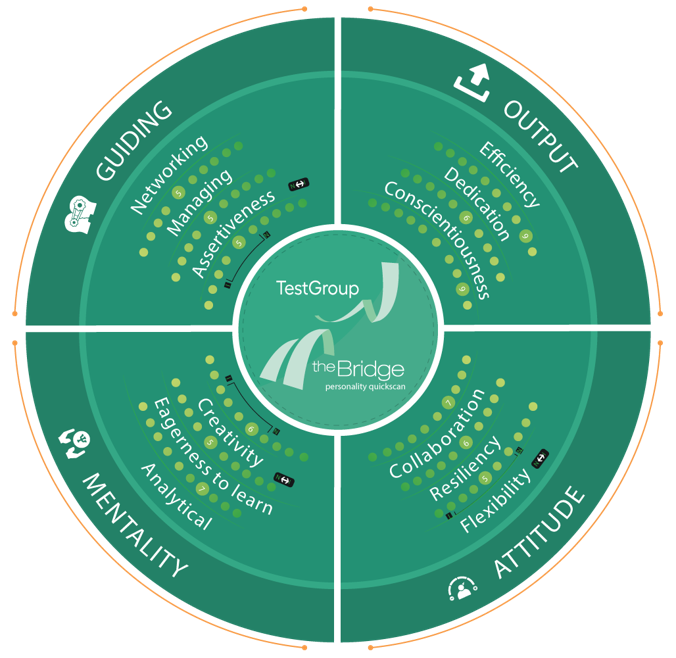Short personality test trait: Collaboration
The Bridge Personality Quickscan is a short personality test developed to test personality within 12 minutes, perfect for dynamic companies looking to streamline their recruitment process or gain deeper insights into their workforce. Known for its straightforwardness and ease of use, it has become a go-to selection tool for many organizations worldwide.
You can order this test separately (per candidate) or administer it yourself via an account on the Bridge Assessment Platform.
Rooted in the Big Five personality framework, renowned for its ability to predict job performance accurately, this short personality test is a reliable choice for evaluating potential hires. Its interactive design encourages honesty through 72 questions, enabling participants to take the test remotely at their leisure and providing instant results. This level of efficiency makes it an invaluable asset for fast and effective recruitment decisions.
The Bridge Personality Quickscan assesses 12 personality traits. This page focusses on the personality trait: Collaboration and highlights its importance and benefits within the workplace.

Enhancing team performance through effective collaboration
Collaboration is a critical personality trait in companies, encompassing the skills required to effectively work alongside others towards a common goal. Beyond merely cooperating on projects, effective collaboration involves influential communication, adept decision-making, and leadership—qualities that transform an individual into a valuable team member. This webpage delves into the essence of collaboration skills, their importance in the workplace, and strategies for businesses to cultivate a culture of collaborative success.
The foundation of collaboration
Collaboration skills are the bedrock of productive team dynamics, enabling individuals to harmonize diverse perspectives, manage shared priorities, and fulfill the team's expectations dependably. These skills are indispensable across most work settings where teamwork is paramount. Effective collaborators are recognized for their ability to engage in open dialogue, reach consensus on goals and methodologies, acknowledge team contributions, tackle challenges collectively, and prioritize team objectives over personal accolades.
The importance of collaboration in business
Successful collaboration is marked by a spirit of cooperation and mutual respect. Businesses seek employees who not only excel individually but also contribute positively to team objectives, striking a balance between personal achievements and the team's ambitions. However, fostering a collaborative environment extends beyond individual capabilities; it requires nurturing a company culture that values teamwork, offers collaboration training, and recognizes the unique strengths, weaknesses, communication styles, and aspirations of each team member.
Challenges and solutions for collaboration
While the concept of collaboration may seem straightforward, its practical implementation often encounters obstacles. Differences in team members' strengths and communication preferences, coupled with varying personal goals, can impede seamless collaboration. Additionally, the extent to which a company emphasizes and supports collaborative efforts significantly impacts its success.
To overcome these challenges, organizations can implement several strategies:
Cultivating a collaborative culture
For businesses aiming to enhance collaboration within their teams, several steps can be pivotal. Firstly, recognizing the diverse talents and communication styles of employees and aligning them with team roles can maximize efficiency and satisfaction. Additionally, investing in collaboration training and tools can provide teams with the resources they need to succeed. Finally, fostering a company culture that explicitly values and rewards collaborative efforts can significantly influence team dynamics and outcomes.
Collaboration stands as a cornerstone of modern business success, requiring more than just collective effort; it demands effective communication, shared decision-making, and a commitment to mutual goals. By understanding the challenges to collaboration and implementing strategies to foster a cooperative and respectful work environment, organizations can unlock the full potential of their teams. As businesses continue to navigate an ever-changing landscape, the ability to collaborate effectively will remain a key differentiator in achieving lasting success and innovation.
The Bridge Tests & Online Assessments
TestGroup is the official provider of the renowned Bridge tests and online assessments, which are high-quality, scientifically validated psychometric tools used globally. Developed in collaboration with universities around the world, these assessments predict workplace behavior through personality tests, cognitive ability evaluations, and career assessments. We assist organizations globally in using online assessments.















